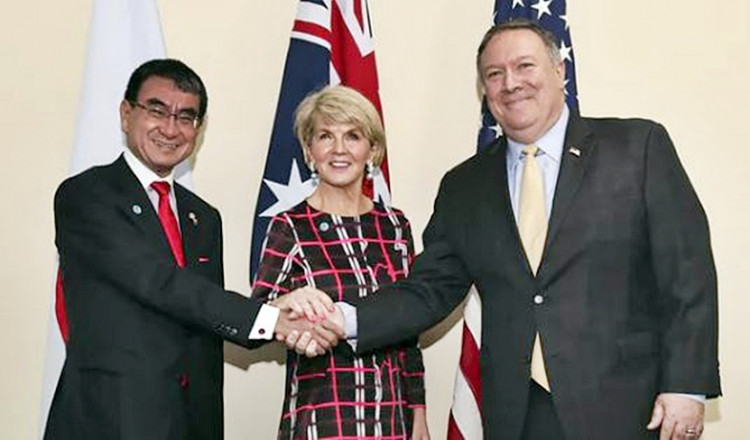U.S Secretary of State Mike Pompeo promised nearly $300 million in new security funding for Southeast Asian countries to bolster the United States' front line against Chinese expansionism in the Indo-Pacific.
This military assistance is understandable since the United States is already the largest foreign investor in ASEAN. In 2015, the U.S. invested $274 billion in ASEAN nations, an amount larger than its investments in China, India, Japan, and South Korea combined.
The massive security assistance package proffered by Pompeo will strengthen maritime security; counter "transnational threats;" develop peacekeeping capabilities and humanitarian assistance, said, Pompeo. The reference to maritime security and transnational threats is an obvious dig at China, which intends to emasculate American power and influence in Asia.
On the other hand, China's State Councillor Wang Yi blasted the United States for sending "massive strategic weaponry" into the South China Sea. He claims this show of military might by the United States puts pressure on China. Wang, however, said he was willing to work with the United States to foster security in the region.
"That is the biggest force behind militarization in this region," said Wang.
The United States last week said it will invest $113 million in technology, energy and infrastructure initiatives in emerging Asia. Pompeo described this package as "a down payment on a new era of U.S. economic commitment to the region."
"As part of our commitment to advancing regional security in the Indo-Pacific, the United States is excited to announce nearly $300 million in new funding to reinforce security cooperation throughout the entire region," said Pompeo during last week's meeting of foreign ministers from the Association of Southeast Asian Nations (ASEAN) and other officials in Singapore.
Pompeo said he raised concerns at the meeting about China's militarization of the South China Sea and the importance of maintaining a rules-based order. The United States will continue to challenge China's claims to own the South China Sea, he said.
Established in 1967, ASEAN now consists of 10 Member States: Brunei, Cambodia, Indonesia, Laos, Malaysia, Myanmar, the Philippines, Singapore, Thailand, and Vietnam. Collectively, ASEAN's 10 Member States are an economic powerhouse. If ASEAN were a single country, it would be the fifth largest economy in the world. It is projected to become the fourth-largest economy by 2050.
The United States wants to develop a "free and open Indo-Pacific" as a counterweight to China's Belt and Road Initiative. The geopolitical game between the United States and China is also being played out in the increasingly bitter trade war engulfing both countries.
Analysts surmise the trade war between Beijing and Washington will eventually enflame tensions at other regional hotspots, notably the South China Sea, which China illegally claims to own.






